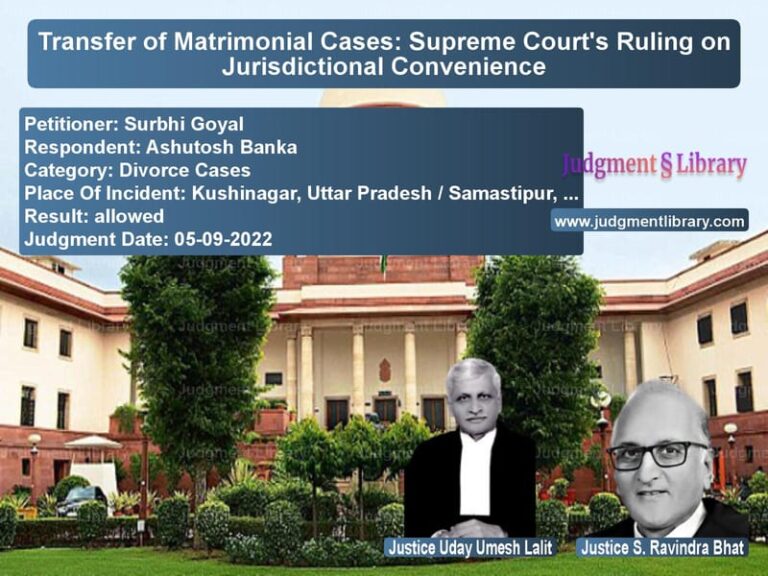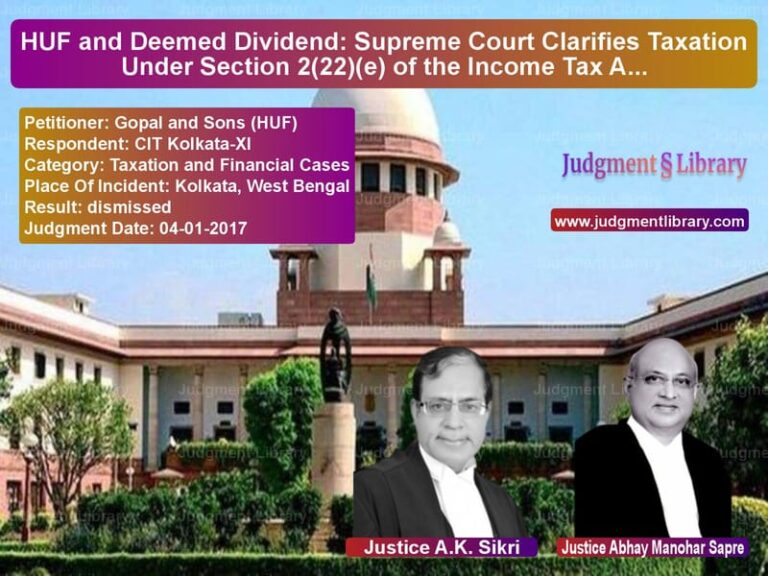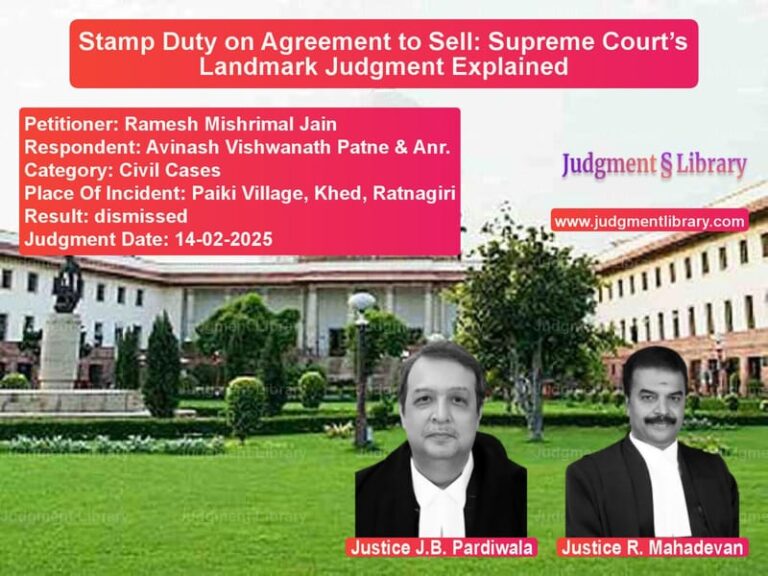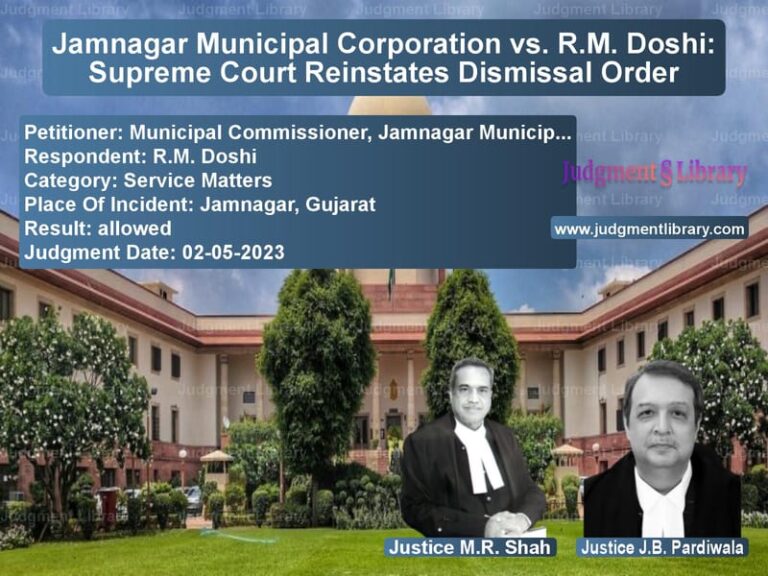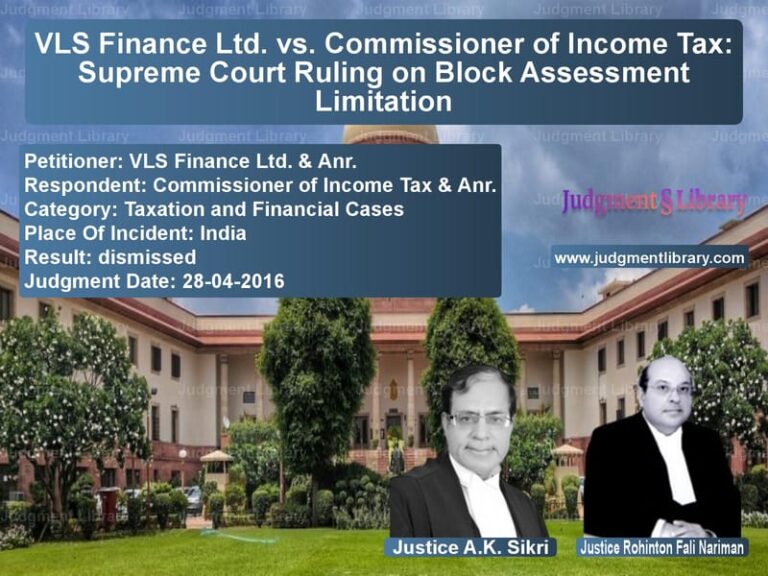Death Penalty Commuted to Life Imprisonment in Child Murder Case
The Supreme Court of India recently ruled on the appeal of Lochan Shrivas, who had been convicted for the brutal rape and murder of a three-year-old girl in Chhattisgarh. The trial court and the High Court had sentenced him to death. However, the Supreme Court commuted his death penalty to life imprisonment while maintaining his conviction. The judgment underscores the principle that while heinous crimes deserve strict punishment, the possibility of reformation must be considered.
Background of the Case
The case dates back to February 24, 2016, when the parents of the three-year-old victim reported her missing. The mother, PW-1, and the father, PW-2, lived in Bajrangdheepa Colony, Chhattisgarh. When the victim was not found, they lodged a missing person complaint at Jutemill Police Station.
During the search, a neighbor, PW-3, informed the parents that the appellant, Lochan Shrivas, had claimed that he could locate the child if allowed to perform a worship ritual. After the ritual, the appellant told them that the child was inside a sack near a roadside pole in Amlibhauna. Suspicious of his behavior, the parents informed the police.
Investigation and Trial Court Proceedings
The police interrogated the appellant, and he confessed to raping and murdering the child. Based on his statement, the police recovered the victim’s body from a sack hidden in the bushes. The trial court convicted him under:
- Section 302 (Murder) of IPC
- Section 376(2)(i) (Rape) of IPC
- Section 377 (Unnatural Offenses) of IPC
- Section 201 (Causing Disappearance of Evidence) of IPC
- Section 6 of the POCSO Act
The trial court sentenced him to death for murder and awarded rigorous imprisonment for other offenses.
High Court’s Confirmation of Death Penalty
The appellant challenged the trial court’s ruling in the High Court of Chhattisgarh, Bilaspur. The High Court dismissed his appeal and confirmed the death penalty, stating that the crime was heinous and warranted the highest punishment.
Arguments Before the Supreme Court
Appellant’s Arguments:
- The prosecution relied solely on circumstantial evidence and failed to establish an unbroken chain of events leading to his guilt.
- The place from where the victim’s body was recovered was accessible to all, weakening the prosecution’s claim that he alone had knowledge of its location.
- There were procedural lapses, including the cutting of his fingernails by a barber instead of a forensic expert, and insufficient legal representation during trial.
- The death penalty was excessive, as his background and possibility of reformation were not considered.
Prosecution’s Arguments:
- The appellant voluntarily led the police to the victim’s body, proving his involvement.
- Scientific evidence, including forensic tests, corroborated the prosecution’s case.
- The nature of the crime, involving the rape and brutal murder of a minor, fell within the ‘rarest of rare’ category, justifying the death penalty.
Supreme Court’s Observations
The Supreme Court acknowledged the brutality of the crime but examined whether the death penalty was justified. The Court reiterated the principles laid down in Bachan Singh v. State of Punjab and Machhi Singh v. State of Punjab, emphasizing that:
- The death penalty should be imposed only in the ‘rarest of rare’ cases.
- The focus should not only be on the crime but also on the criminal’s background and potential for reformation.
- The State must provide evidence proving that the convict cannot be rehabilitated.
Final Judgment
The Supreme Court upheld the appellant’s conviction but commuted his death sentence to life imprisonment. It ruled that:
- The trial court failed to consider the appellant’s socio-economic background and reformation prospects.
- The appellant had no prior criminal record and was only 23 years old at the time of the offense.
- The jail superintendent confirmed that his conduct in prison had been satisfactory.
- The prosecution did not establish that the appellant was beyond rehabilitation.
The Court sentenced him to life imprisonment without parole for 30 years.
Key Takeaways
- Balancing justice and reformation: The judgment reiterates that even in heinous crimes, courts must assess the potential for reformation before awarding the death penalty.
- Importance of proper legal defense: The case highlights concerns regarding legal representation in capital punishment cases and the need for a fair trial.
- Strict sentencing approach: While the Court commuted the death sentence, it imposed a strict 30-year imprisonment term without parole, ensuring severe punishment.
This ruling reinforces the judicial principle that while justice must be served, the death penalty should be reserved for cases where reformation is impossible.
Petitioner Name: Lochan Shrivas.Respondent Name: State of Chhattisgarh.Judgment By: Justice L. Nageswara Rao, Justice B.R. Gavai, Justice B.V. Nagarathna.Place Of Incident: Chhattisgarh.Judgment Date: 14-12-2021.
Don’t miss out on the full details! Download the complete judgment in PDF format below and gain valuable insights instantly!
Download Judgment: lochan-shrivas-vs-state-of-chhattisgar-supreme-court-of-india-judgment-dated-14-12-2021.pdf
Directly Download Judgment: Directly download this Judgment
See all petitions in Murder Cases
See all petitions in Rape Cases
See all petitions in Judgment by L. Nageswara Rao
See all petitions in Judgment by B R Gavai
See all petitions in Judgment by B.V. Nagarathna
See all petitions in partially allowed
See all petitions in Modified
See all petitions in supreme court of India judgments December 2021
See all petitions in 2021 judgments
See all posts in Criminal Cases Category
See all allowed petitions in Criminal Cases Category
See all Dismissed petitions in Criminal Cases Category
See all partially allowed petitions in Criminal Cases Category



